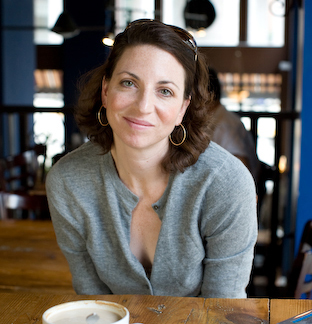After my first visit to the farm, I quickly invited myself back. “I’m coming there without my kids,” I told him.
When I got there, he made me hamburger that was shaped a little too much like how it might have looked in the cow’s body, and then he asked me what I wanted.
“I want this to be a date,” I said.
“And then what do you want?”
“Well. I don’t know. I guess we kiss. That’s what you do on a date.”
The farmer laughed. And he asked me if I thought I could live on a farm.
I said no. I said I was thinking this would be a summer fling.
I’m sure I don’t need to tell you that he is not the summer fling type.
I sat across from him at his kitchen table thinking that he is so simple and stupid for thinking I could be serious about him.
After dinner we walked through his fields, over his creek, and next to his hay, and an hour later I thought that I am so simple and stupid for thinking that just because he is a farmer, I am not serious.
So I went back to the farm three times in one week to negotiate how a date might work. Each time I felt like I was crazy. What am I doing with a farmer? I am already sometimes sleeping only four hours a night. There is no room in my life for anything but kids and work.
The next time I was there, it was time to put the chickens back in the house or pen or whatever it is that they live in. I noticed that the farmer sort of encourages them to go to the house, but really, they could get away at any time. But they go back to the house because he gives them everything they could want there.
One hen will not come in. The farmer waits. He negotiates. Then he walks away. He says the hen is not ready. I worry out loud that she will be eaten by coyotes. He says she will decide to go in before that happens, and he’ll be there. He says it’s timing.
The timing is what gets me, though. This is not a good time in my life to fall for a farmer. Of all the things to invest my time in, this is not one of them. It’s not something that will work out. So moments of doubt turn into time-management panic.
Like, at the end of our second date, the farmer walked me to my car, which was on his front lawn, and he kissed me goodnight. I got in the car and looked behind me, and somehow, in the span of seconds between going from the car back to the house, he started peeing. On the front lawn.
I got out of the car.
“Are you kidding me?!!? Are you peeing on your front lawn? Are you nuts?”
“This is normal.”
“No. This is not normal!”
He laughs.
I laugh.
But I am not sure we are laughing for the same reasons.
“On the farm you pee outside if you’re outside and you pee inside if you’re inside.”
I tell him this is a huge cultural gap and we have a huge problem.
I come back the next day even though the more things are weird with the farmer the more I worry that I am making a poor time management decision by spending time with him.
The next day, he is very tired. He woke up at 4 a.m. because he heard thunder and he knew that the mother who has new twin calves would lose one in the rain. He went out and found the lost one and brought it back to the mom.
He tells me this story while we sit on the sofa on his porch. This is where we do everything. I hope we will make out on the sofa. But he is tired. And I am scared of being rebuffed, so we talk.
“How much would it cost you to lose a calf?”
“About $200.”
“You do all that work for months and months just for $200?”
“It’s not that much work every day for one calf. This is an exception. But bringing the calf back to its mother is not about the money. It’s about taking care of the animal.”
You can see where this is headed, right? We have this conversation 500 times.
Here’s another version, different day, same porch:
“I can’t move to the farm because I have so much more money than you do. I will get into the same situation with my last marriage. I will have all the power and it will be terrible.”
“I don’t think you have more money. I have more money. ”
“You made $15,000 last year. And it was a good year. I made $15,000 for one speech just last week.”
“You make a lot of money, but you spend it. You’re in debt.”
“It’s about cash flow. I have a lot coming in. I could have a lot. If I decided to be good with money.”
“My land is worth $2 million.”
“Really!??! That’s so exciting!”
“I’d never sell it. The land means way more to me than the money. And it’s ridiculous that you spend $200 on a pair of jeans.”
So I do this drive, this three-hour drive, again and again to see the farmer. Because I feel like I am understanding myself better and better as I go farther and farther from where I think I belong. Until I find myself in a tornado, ignoring his phone calls to tell me that a tornado is too dangerous and I should stay home.
I read that people do totally crazy things when they are in love, but how do you explain me driving to the farm in a tornado to negotiate something that is not a summer fling while we sort of start having a summer fling? If I can’t count it toward being in love, then does it just count toward losing my mind?
But I don’t think I’m losing my mind. For example, I know it’s the farmer’s understanding that my children matter most that makes him hard to regard as just a summer fling.
One of the times I had the kids with me, I spent most of my time worrying that they would get into trouble, while the farmer did things like help them climb up onto hay scrunched up into sushi-shaped rolls that were too large for the kids to get down from. And then he said, “Thank you for yelling at the kids for stepping on the corn so I could focus on just having fun on the farm with them.”
For a while the farmer was very careful about the kids only coming on days he could be around, because of things like the electric fence, which he has memories of as a kid that include falling on it while riding a bicycle and getting shocked fifty times.
But then I got an email from him that said, “You are welcome at my house with the boys. I trust your judgment and I think you know most of the dangers. But remind me to take the gun out of the house.”
I never thought I’d get an email about a gun that was so touching.
So I cut back on work. But I still did an interview with a teacher’s publication while sitting on the farmer’s front porch. He laid down next to me with his arm on my leg. He said he likes hearing me work but he also likes that I don’t bring the Blackberry when I go to his fields.
“There’s reception in the field?”
“Yeah. Other people bring it there when they visit.”
I don’t tell him that I would have brought it if I’d have known. Because I don’t want to be that person. But it’s so scary that this might go on too long and be squandered time.
I snuggle up next to him on the porch and I tell him that he makes me nervous because I’m risking so much for him.
He says, “What exactly are you risking?” And he points out that he has agreed to allow his very private life to be the subject of very public blog posts, which makes him nervous.
I am silent. I feel awkward because I’m supposed to be the queen of work life balance. But I tell him that cutting back on work seems like a huge risk to me.
I know that people who are workaholics are scared of two things: Not being great at work, and having to face an empty personal life. And I’m worried about both. It’s so hard to cut back on work that I adore to see a guy who is a complete wild card in my life. But I see now that the farmer doesn’t need to be THE ONE. And there’s value for me to just stop working so hard. That’s the first step. I’m just lucky I found someone who makes me want to try that.


